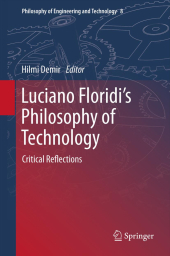 Neuerscheinungen 2014Stand: 2020-02-01 |
Schnellsuche
ISBN/Stichwort/Autor
|
Herderstraße 10
10625 Berlin
Tel.: 030 315 714 16
Fax 030 315 714 14
info@buchspektrum.de |

Hilmi Demir
Luciano Floridi´s Philosophy of Technology
Critical Reflections
Herausgegeben von Demir, Hilmi
2012. 2014. xviii, 274 S. 235 mm
Verlag/Jahr: SPRINGER NETHERLANDS; SPRINGER 2014
ISBN: 9400791976 (9400791976)
Neue ISBN: 978-9400791978 (9789400791978)
Preis und Lieferzeit: Bitte klicken
This philosophical analysis of new technologies leads to a novel metaphysical framework in which understanding of reality shifts from materialistic to informational. In this world, all entities, natural or artificial, are analyzed as informational entities.
Information and communication technologies of the 20th century have had a significant impact on our daily lives. They have brought new opportunities as well as new challenges for human development. The Philosopher: Luciano Floridi claims that these new technologies have led to a revolutionary shift in our understanding of humanity´s nature and its role in the universe. Florodi´s philosophical analysis of new technologies leads to a novel metaphysical framework in which our understanding of the ultimate nature of reality shifts from a materialist one to an informational one. In this world, all entities, be they natural or artificial, are analyzed as informational entities. This book provides critical reflection to this idea, in four different areas: Information Ethics and The Method of Levels of Abstraction The Information Revolution and Alternative Categorizations of Technological Advancements Applications: Education, Internet and Information Science Epistemic and Ontic Aspects of the Philosophy of Information
Part I: Information Ethics and The Method of Levels of Abstraction.- 1.Floridi´s Information Ethics as Macro-Ethics and Info-Computational Agent-Based Models;Gordana Dodig-Crnkovic.- 2.Artificial Agents, Cloud Computing, and Quantum Computing: Applying Floridi´s Method of Levels of Abstraction;M.J. Wolf, F.S. Grodzinsky and K.W. Miller.- 3.Levels of Abstraction and Morality;Richard Lucas.- 4.The Homo poieticus and the Bridge between Physis and Techne;Federica Russo.- Part II: The Information Revolution and Alternative Categorizations of Technological Advancements.- 1. In the Beginning Was the Word and Then Four Revolutions in the History of Information;Anthony F. Beavers.- 2. I Mean It! (And I Cannot Help It): Cognition and (Semantic) Information;Valeria Giardino.- Part III: Applications: Education, Internet and Information Science.- 1.What Happens to Infoteachers and Infostudents after the Information Turn?;Elena Pasquinelli.- 2. Content Net Neutrality - A Critic; Raphael Cohen-Almagor.- 3. Information Science and Philosophy of Information: Approaches and Differences; Armando Malheiro da Silva and Fernanda Ribeiro.- Part IV: Epistemic and Ontic Aspects of the Philosophy of Information.- 1. Skepticism and Information; Eric T. Kerr and Duncan Pritchard.- 1. Levels of Abstraction; Levels of Reality; Joseph E. Brenner.- 2. The Floridian Notion of the Information Object; Steve T. McKinlay.- Part V:.- 1. The Road to the Philosophy of Information; Luciano Floridi.
_


